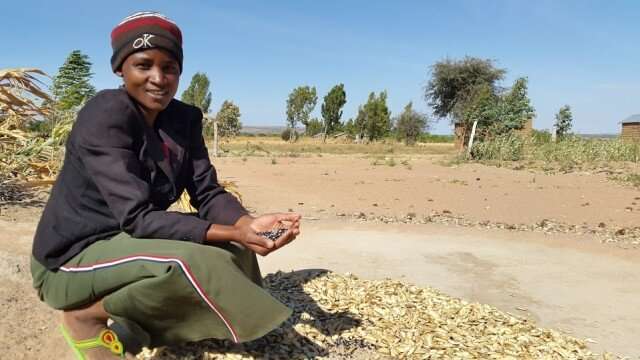A mentor farmer shows off some of her legume harvest. Credit: Marianne V. Santoso
An innovative practice of farmers mentoring farmers on sustainable agricultural methods, nutrition and social equity has been proven beneficial in improving children's diets and decreasing food insecurity in a region of Tanzania where nearly half of households fail to meet minimum nutrition requirements. It also reduced depression among women.
Anthropologists and nutritionists from Northwestern, Cornell University and Nelson Mandela African Institution of Science and Technology conducted a groundbreaking study that demonstrated that farmer-to-farmer training can boost nutrition and well-being.
Focused on smallholder farmers with young children, the program centered on farmers training other farmers on what they considered to be best practices. External inputs were limited to providing enough legume seeds for 0.25 acres twice during the three-year project.
The intervention succeeded in improved children's dietary diversity by nearly one whole food group (.57 out of seven) and reduced the proportion of families who were food insecure by 12.5 percentage points. There was also an 11.6 percentage point reduction in women experiencing depressive symptoms.
Corresponding author and co-principal investigator Sera Young, associate professor of anthropology and a fellow at Northwestern's Institute for Policy Research said, "The study is a microcosm of how the interconnected global challenges of undernutrition, social inequity and sustainable food production can be addressed concurrently and harmoniously."
"A key aspect of the participatory approach was its emphasis on improving gender equity and mental health," said the study's lead author Marianne V. Santoso, a postdoctoral research fellow in Northwestern's department of anthropology. "In the intervention households, women had more to say about how household income was spent, and men were more involved in household chores and childcare."
"As far as we know, this is also the first agriculture intervention to show impact on women's mental health," Santoso said.
Tackling a global issue
Two billion people experienced food insecurity, and 144 million children under the age of five were malnourished in 2019, according to a report published in 2020 by the Food and Agriculture Organization of the United Nations. The project addresses the global problem of food insecurity by reaching a key group poised to make a difference: smallholder farmers.
Worldwide, an estimated 500 million smallholder farming households manage more than 80% of the farmland and produce 80% of the food supply, supporting an estimated 1.5 billion people.
Peer-learning approach
The project builds on the work of co-principal investigator Rachel Bezner Kerr, professor of global development in the College of Agriculture and Life Sciences at Cornell. Kerr has been using a peer learning approach for sustainable farmland food security with a farmers organization in Malawi for 20 years.
The Tanzanian study extended this work by testing if this approach could work in a new climatological and cultural environment. It rigorously evaluated the impacts on outcomes like food security, nutrition and women's empowerment using a randomized study design.
"There were a lot of questions about whether an approach that is effective in one place can work in other contexts," said Bezner Kerr. "We found that this intervention approach of combining agroecology with attention to nutrition and gender equity led to improvements in food security and children's dietary diversity."
American and Tanzanian researchers invited food-insecure smallholder farmers with children less than one year old from 20 villages in the region of Singida, Tanzania, to participate. Ten of the villages began the program, while the other 10 served as a control group for two years before mentor farmers began sharing messages about sustainable farming, nutrition and social equity in their villages.
In total, 591 households participated, split evenly between the intervention and control groups. Before training began, the researchers conducted surveys about nutrition, farming practices and gender equity; they also measured children's growth. Households in the intervention group could choose the legume seeds they wanted to plant, including cowpea, groundnut and pigeon pea. These enriched soil with nitrogen and added diversity to staple sorghum, millet and corn crops they grew. Farmers were able to save legume seeds from crops they grew for the following year.
At the start of the program, one man and one woman from each of the 10 control group villages were elected by their fellow villagers to be peer mentors and traveled to Malawi to learn about different practices used by the Malawian farmers.
Next, Malawian peer-mentors traveled to Tanzania to teach a two-week integrated course co-designed by farmers and researchers. The course included hands-on activities about agroecology, gender and social equity, child nutrition and climate change.
The study published May 10 at 8 p.m. CDT in the Journal of Nutrition.
A second paper focused on gender equity data and mental health outcomes is forthcoming in in the journal Public Health Nutrition. A preprint of the study can be viewed online.
"We are hopeful that this approach can be replicated in other settings," said Young. "The curriculum has already been translated into several languages commonly spoken in southern and eastern Africa. We also hope that sustainable farming specifically and participatory approaches more generally will become more mainstream in nutrition interventions."
More information: Marianne V Santoso et al. A Nutrition-Sensitive Agroecology Intervention in Rural Tanzania Increases Children's Dietary Diversity and Household Food Security But Does Not Change Child Anthropometry: Results from a Cluster-Randomized Trial, The Journal of Nutrition (2021). DOI: 10.1093/jn/nxab052
Food security mediates the decrease in women's depressive symptoms in a participatory nutrition-sensitive agroecology intervention in rural Tanzania. www.cambridge.org/core/journal … 7E5EF967CF79#metrics
Journal information: Journal of Nutrition , Public Health Nutrition
Provided by Northwestern University























